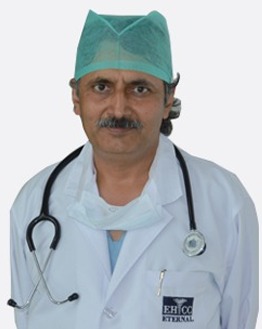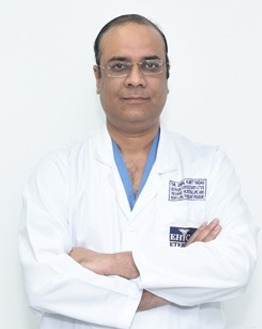Bypass surgery, commonly referred to as coronary bypass surgery, aims at creating a bypass route for redirecting blood around the blocked portion of an artery. This is done by taking a small section of a healthy artery from the patient's leg, arm or chest and connecting it to the start and end of the blocked portion of the artery. This is done to create a new pathway for improving blood flow. CABG is recommended for patients with severe coronary heart disease. Increased life expectancy has led to an increase in various cardiovascular diseases too and this has resulted in a hike in the number of primary and secondary CABG procedures in elderlies. Secondary bypass surgery is commonly referred to as Redo Bypass Surgery. The procedure is comparatively complex and requires immense experience and expertise.
Indications of Bypass surgery
Coronary heart diseases are marked by an increase in cholesterol levels that result in the formation and accumulation of a waxy substance in the coronary arteries. Commonly referred to as plaque, this waxy substance can continue to pile up and become hard, eventually blocking the supply of oxygenated blood to your heart. In extreme cases, the plaque leads to the formation of a blood clot.
Some of the common indications of coronary Bypass surgery include:
- Chronic chest pain caused by narrowing of the arteries that are responsible for supplying blood to your heart muscles
- Having two or more diseased coronary arteries, along with dysfunctional left ventricle
- Blockage in the left main coronary artery
- An arterial blockage that cannot be treated by angioplasty
- History of Angioplasty stent placement that has not been successful
- A Redo-CABG is recommended to patients whose coronary arteries narrow down again going to an underlying chronic heart disease which can, again, trigger plaque formation.
What is done during CABG/Redo CABG?
CABG/Redo CABG surgical procedure in which a healthy artery or vein is taken from the arm or leg of the patient is connected to a blocked coronary, bypassing the diseased portion of the same. This helps to create a new passage for the free flow of oxygenated blood. The whole procedure is carried out under the influence of general anesthesia and takes anywhere between 3 to 6 hours.
Advantages of CABG
- The surgery has to improve the quality of the patient's life by alleviating CHD symptoms like angina.
- The surgery allows you to return to normal day to day activities
- The surgery helps to enhance the pumping function of your heart muscles
- The surgery will help to significantly lower the risk of a heart attack in patients who have diabetes
Why Eternal Hospital?
At Eternal Hospital, we have a highly qualified and dedicated team of cardiologists who are always committed to providing the latest and most advanced medical care to all our patients. Being a trusted name in healthcare, we act compassionately while ensuring confidentiality to those who need it. We have set high standards in patient-centric premium care along with outstanding patient safety and exceptional maintenance in a timely manner. We adhere to the use of up to the minute innovations to offer state-of-the-art treatments to our patients with unparalleled results.



